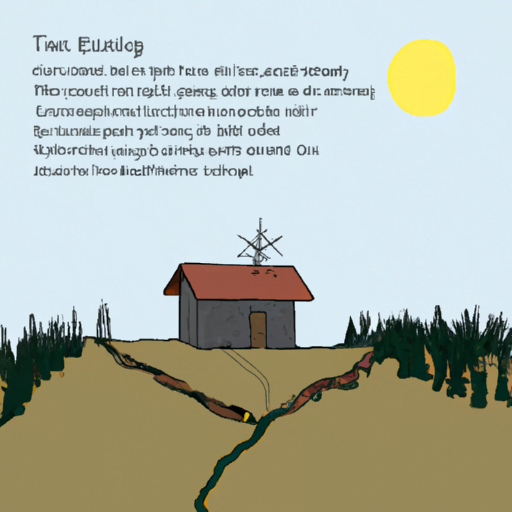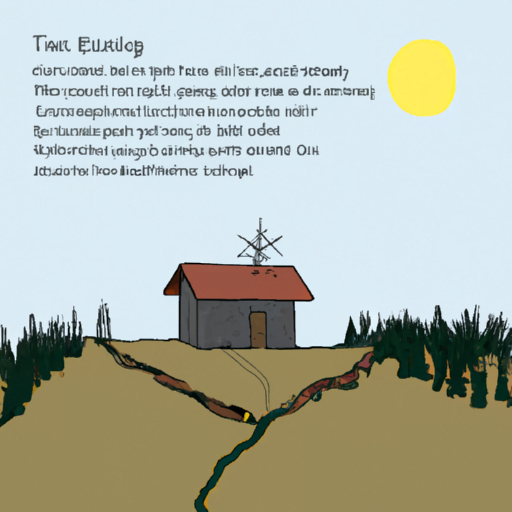Have you ever wondered what it would be like to live off the grid? Maybe you’ve dreamt of escaping the hustle and bustle of city life, disconnecting from technology, and embracing a simpler way of living. Living off the grid certainly has its appeal, but it’s not without its downsides. In this article, we’ll explore the disadvantages of off grid living and give you a better understanding of what to expect if you decide to take that leap.
Living off the grid means being completely self-sufficient, relying on alternative energy sources like solar power and wind turbines, and often growing your own food. While this may sound idyllic, it’s important to consider the potential challenges that come along with it. One major downside is the lack of modern amenities we often take for granted, such as access to reliable internet, running water, and even basic utilities. Additionally, living off the grid requires a significant initial investment and ongoing maintenance to ensure your alternative energy sources are functioning properly.
Another disadvantage of off grid living is the potential for social isolation. Living in remote areas away from the conveniences of a bustling community means limited interaction with neighbors and a decreased sense of community. This can be particularly challenging for individuals who thrive on social connections and enjoy being part of a larger network. Furthermore, living off the grid can sometimes mean dealing with the practicality of being far away from medical facilities, which can be a concern in case of emergencies.
While the idea of living off the grid may seem appealing to many, it’s important to consider the downsides before making the decision. However, it’s worth noting that the drawbacks are subjective and what may be a downside to one person could be seen as an advantage to another. In our upcoming article, we will explore the ways you can overcome these challenges and make the most out of your off grid lifestyle. Stay tuned for more information on how to navigate the downsides and enjoy the benefits of living off the grid.

The Downside of Living Off the Grid
Living off the grid can be an appealing thought for many people. The idea of being self-sufficient, reducing your carbon footprint, and disconnecting from the fast-paced modern world certainly has its allure. However, it is important to consider the downsides before making the decision to go off the grid.
Limited access to modern amenities
One of the main drawbacks of living off the grid is the limited access to modern amenities that most of us take for granted. Being disconnected from the electrical grid means relying on alternative sources of power such as solar panels or wind turbines. While these can be effective, they may not provide a consistent and reliable source of electricity. This can make it difficult to power essential appliances and devices such as refrigerators, air conditioners, and even charging your phone.
Additionally, living off the grid usually means being disconnected from municipal water systems. This means you will need to rely on alternative water sources such as wells or rainwater collection systems. While these methods can provide clean water, they may require regular maintenance and can be unpredictable, especially in times of drought or heavy rainfall.
Higher upfront costs
Another downside of off grid living is the higher upfront costs associated with establishing a sustainable off grid lifestyle. Investing in solar panels, wind turbines, batteries, and other renewable energy systems can be quite expensive. The initial setup costs can be a significant burden for many people, especially when compared to the relatively lower costs of connecting to the electrical grid.
Time and effort for maintenance
Living off the grid requires a considerable amount of time and effort for maintenance and upkeep. Renewable energy systems, water collection systems, and other off grid infrastructure require regular servicing and maintenance to ensure they are functioning properly. This can be time-consuming and may require specialized skills or knowledge. If you are not comfortable doing these tasks yourself, it may mean having to hire professionals, which can add to the overall costs of living off the grid.
Dependence on weather conditions
When living off the grid, you become more dependent on weather conditions. This is particularly true if you rely heavily on solar or wind power. Cloudy days or a lack of wind can significantly impact your ability to generate electricity. This means you may have to carefully plan your energy usage and be prepared for periods of reduced power availability.
Furthermore, relying on alternative water sources like rainwater collection systems also puts you at the mercy of weather patterns. A lack of rainfall can quickly deplete your water supply, forcing you to find alternative sources or conserving water until the next rainfall.
Limited social interaction
Living off the grid often means isolating yourself from society to some extent. If you choose a remote location for your off grid home, you may find yourself far away from friends, family, and social activities. This can result in feelings of loneliness and isolation, especially if you thrive on regular social interaction.
Maintaining relationships with friends and family may also become more challenging, as distance and potentially limited access to communication technologies can make staying in touch more difficult. It’s important to consider the potential impact on your social life and wellbeing before making the decision to live off the grid.
Difficulty in obtaining financing
Financing an off grid lifestyle can be challenging. Traditional lenders may view off grid living as a risky investment and be hesitant to provide financing options. This can make it difficult to secure loans or mortgages to purchase land or build an off grid home. Alternative financing options may be available, but they often come with higher interest rates or other unfavorable terms.
Risk of isolation and loneliness
Living off the grid can be physically and emotionally demanding. The lack of social interaction, limited access to modern amenities, and potential challenges of self-sufficiency can contribute to feelings of isolation and loneliness. It’s important to evaluate your ability to handle these factors and consider how they may impact your mental wellbeing.
Challenges in sourcing food and water
Living off the grid often requires a high degree of self-sufficiency, including growing your own food and sourcing your own water. This can be a significant challenge, especially if you do not have prior experience or knowledge in farming or gardening. Growing enough food to sustain yourself and your family can be time-consuming and labor-intensive, especially if you are relying on organic or sustainable farming practices.
Similarly, sourcing clean water can be challenging, particularly in areas with limited access to fresh water sources. This may require investing in water filtration systems or relying on alternative methods of water collection, such as digging wells or harvesting rainwater.
Limited access to medical services
Living off the grid often means being located far away from medical facilities and services. This can present a significant challenge in case of emergencies or the need for regular medical care. It may require longer travel times to access medical professionals and facilities, potentially compromising your health and well-being.
Potential legal and regulatory issues
Finally, living off the grid may present legal and regulatory challenges. Building codes and zoning restrictions may limit your ability to construct or modify structures on your off grid property. Additionally, local regulations may govern your use of alternative energy systems, water sources, and waste management practices. Violating these regulations can result in fines or other legal consequences.
In conclusion, while living off the grid offers many benefits and the chance to live a more sustainable and self-sufficient life, it is important to carefully consider the downsides before making the decision to disconnect from modern amenities. Limited access to modern amenities, higher upfront costs, time and effort for maintenance, dependence on weather conditions, limited social interaction, difficulty obtaining financing, risk of isolation and loneliness, challenges in sourcing food and water, limited access to medical services, and potential legal and regulatory issues are all factors to consider before embarking on an off grid lifestyle. It is essential to thoroughly research and assess your own preferences, capabilities, and resources to determine if off grid living is the right choice for you.





